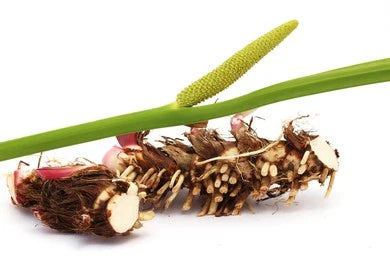This soft plant grows 2-4 feet tall and is found at the wet edges of lakes and streams. The leaves have a green tint and are 2-4 feet long and 1 inch wide, with wavy edges. The blooms are tiny, packed, and have a pale color. Fruits have many seeds and are pulpy. Its reddish, hairy, underground root is similar to the rhizome of ginger. This plant has aromatic roots and leaves. Strong-smelling plants are thought to have the highest quality.
General Information
Around the world, Acorus calamus, sometimes referred to as "Vacha" in Sanskrit, has been employed for a variety of purposes. Alternative medicine has long found this monocot herb to be quite helpful, whether it is used to treat hallucinations or as a medication to enhance speech and memory.
This herb has strong-smelling rhizomes that closely resemble ginger. There is no doubting the efficacy of this herb's chemical ingredients, such as asarone, due to their potent action on the neurological system.
However, the U.S. FDA has prohibited its use, claiming that its chemical components are highly carcinogenic, citing numerous rat trials that led to the development of cancer in the rats. Nevertheless, when administered under medical supervision, this plant can have enormously beneficial effects for humans that the trials cannot rule out.
According to Ayurveda, Vacha is an extremely energizing nervine tonic that raises the body's satvic content and awakens the kundalini. It has many other health advantages as well as being one of the greatest medicines for mental health issues to date.
With lengthy, less aromatic leaves and potently aromatic roots, Vacha is a semi-aquatic perennial herb. Perfumes are made using the fragrance.
Two types of vacha are mentioned by Acharya Charak:-
- Vacha (Acorus calamus)
- Shweta vacha (Iris germanica)
This plant has five different varieties according to Bhavprakash:-
- Vacha (Acorus calamus)
- Parasika vacha (Iris germanica)
- Kulajana (Alpinia galangal)
- Sthoola granthi (Zingiber zerumbet)
- Dveepantra vacha (Chopachini – Smilax China)
Special note about Acorus Calamus
Acorus calamus is well known for treating mental health issues, particularly memory and substance overuse. In addition to this, it is a fantastic detoxifying herb that eliminates ama and creates enduring health. This herb's specific action is to enhance intellect naturally.
Classification
- Kingdom - Plantae
- Order - Acorales
- Family - Acoraceae
Names
- Sanskrit Name – Lomasha, jatila, Khadiravacha, golomi, ugragandha, shadgrantha, hemavati, etc.
- English Name – Myrtle grass, Rat root, German ginger, Sweet flag, Calamus, etc.
- Hindi Name – Ghorvach, Safed Vach, Vach
- Telugu Name – Vasa
- Tamil name – Vashambu
- Malayalam Name – Bavambu
- Gujarati Name – Godavaj
- Urdu Name – Vach, baj
- Nepali Name – Bojho
Habitat
Calamus is a worldwide semi-aquatic perennial monocot. It is grown in Burma and India in wet, swampy areas. It is widely accessible in India's Naga Hills and Manipur. It grows in profusion along the borders of lakes and streams.
Ayurvedic Properties
|
Particular |
Hindi / Sanskrit |
English |
|
Rasa (Taste) |
Katu, Tikta |
Pungent, Bitter |
|
Guna (Physical Property) |
Laghu, Tikshana |
Light, Sharp |
|
Virya (Potency) |
Ushna |
Hot |
|
Vipaka (Post-Digestive Taste) |
Katu |
Pungent |
Effects On Doshas
It balances Vata and Kapha doshas.
|
Charak Samhita |
Sushrut Samhita |
Vagbhata |
Bhavprakash |
|
Pipalayadi, Mustadi, Vachadi |
Mustadi, Vachadi, Vastadi, Haridradi chardana, Niruhana |
Deepana, Vamana |
Practical uses
- "Ama" or the poisonous metabolites that build up in our bodies due to our unhealthy lifestyle and eating patterns are dissolved and digested by Vacha. Additionally, it enhances digestion by acting on the digestive fire.
- The herb's intake needs to be closely regulated because taking too much of it can cause severe vomiting.
- It enhances general bodily vitality and is beneficial to the mind, as was previously noted. Paralysis, epilepsy, schizophrenia, and neuralgia are a few mental illnesses where Vacha is particularly helpful.
- In the Himalayas, people use vacha as a folk remedy to treat speech issues in children. The herb is tied around the child's neck in the form of a necklace, and the effect is reported to be quite favorable, particularly if the child is experiencing speech difficulties.
- Vacha's detoxifying qualities include the ability to loosen the bowels, which relieves constipation and colic in the abdomen.
- Vacha is able to balance a wide range of neurological issues (mostly caused by an imbalanced vata dosha) as well as digestive issues including bloating and constipation because of its very balancing effect on the body's dysregulated vata dosha.
- Vacha also has the uncommon effect of decreasing obesity; in this instance, the udvartana is applied topically to the body.
- Strong uterine contractions caused by vacha can truly ease a challenging or protracted delivery. It can also be administered for dysmenorrhea. It is important to keep in mind that, for the same reason, this plant should not be used when pregnant.
- to be carefully provided to individuals with Pitta bodily constitutions. Vacha should also be administered to children with extreme caution; it is best avoided during nursing.
- Vacha is used in several combinations with other mind-boosting herbs like tagar, Jatamansi, etc. to treat various nerve illnesses.
Dosage
Powder: 125-500 mg in divided dosage.
Useful Parts
Sweet flag Rhizome

